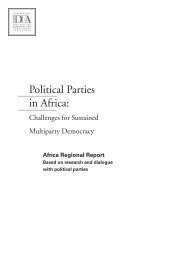Seminar Report The role of Political Parties in Democratic Transitions
Seminar Report The role of Political Parties in Democratic Transitions
Seminar Report The role of Political Parties in Democratic Transitions
You also want an ePaper? Increase the reach of your titles
YUMPU automatically turns print PDFs into web optimized ePapers that Google loves.
know each other at a personal level as human be<strong>in</strong>gs, only then can they get to know each other as<br />
political be<strong>in</strong>gs.<br />
Mr Shaun MacKay went on to cover the follow<strong>in</strong>g po<strong>in</strong>ts:<br />
1. Why it is important to have an <strong>in</strong>formal platform outside parliament?<br />
He provided three key reasons:<br />
Consensus seek<strong>in</strong>g: An <strong>in</strong>formal platform lends itself to consensus seek<strong>in</strong>g, opposed to parliament<br />
where politicians are <strong>in</strong>volved <strong>in</strong> a debate and it is <strong>of</strong>ten more about scor<strong>in</strong>g po<strong>in</strong>ts rather than seek<strong>in</strong>g<br />
compromise and consensus. Play<strong>in</strong>g for the gallery, as is <strong>of</strong>ten the case <strong>in</strong> parliament, misses out on<br />
the opportunity to really listen and understand each other.<br />
Equality: Power relations <strong>in</strong> a formal sett<strong>in</strong>g like parliament are very different. Often there is little time<br />
to discuss and exchange views and the big parties <strong>of</strong>ten dom<strong>in</strong>ate debate. In an <strong>in</strong>formal sett<strong>in</strong>g, all<br />
parties are equal and <strong>in</strong> a position to freely and equally share their positions.<br />
Weak l<strong>in</strong>kages between the parties and the members <strong>of</strong> parliament: <strong>The</strong> views expressed <strong>in</strong><br />
parliament do not necessarily express the party’s viewpo<strong>in</strong>t but the <strong>in</strong>dividual MPs position. An<br />
<strong>in</strong>formal platform allows the parties to exchange the party’s positions on policy issues.<br />
He furthermore highlighted two general key characteristics <strong>of</strong> NIMD/DIPD facilitated platforms:<br />
Inclusive nature: All parliamentary political parties are represented and <strong>in</strong> a number <strong>of</strong> countries the<br />
non-parliamentary parties also have a seat.<br />
Confidentiality: Each party is allowed to express itself openly with a view to seek<strong>in</strong>g compromise. In<br />
the glary <strong>of</strong> the public, compromise is <strong>of</strong>ten not possible. Clear rules <strong>of</strong> engagement need to be<br />
def<strong>in</strong>ed to enable the platform to work effectively and transparently and on the basis <strong>of</strong> mutual trust.<br />
2. How do you start the <strong>in</strong>formal dialogue process?<br />
To start the dialogue process and embark on the agenda sett<strong>in</strong>g phase, it is <strong>of</strong>ten useful and strategic to<br />
select less contentious issues at the beg<strong>in</strong>n<strong>in</strong>g, to ensure some early successes and get the process<br />
mov<strong>in</strong>g. More contentious issues can then be tackled at a later stage when a sound foundation has been<br />
laid. Once agreement is reached at the <strong>in</strong>formal platform on a certa<strong>in</strong> reform agenda, it has to be<br />
presented to parliament. Because the platform consists <strong>of</strong> all parliamentary parties, it is easier to do this<br />
as consensus has already been reached. Two aspects are important to make it work. First, the process <strong>of</strong><br />
exchange between the parties and the parliamentary caucus is very essential. <strong>The</strong> caucus needs to be<br />
briefed and closely engaged on the policy process so they can advocate the common positions <strong>in</strong><br />
parliament. A second key requirement is the need to develop policy capacity <strong>in</strong> the party to be able to<br />
develop and analyse alternative policies.<br />
3. How do you structure the dialogue platform?<br />
Structures vary from country to country depend<strong>in</strong>g on the local context. In some countries, the dialogue is<br />
facilitated by an NGO, who acts as the secretariat. Or it could be an autonomous structure established by<br />
the participat<strong>in</strong>g political parties. In that case, the Secretary Generals (SGs) <strong>of</strong> the participat<strong>in</strong>g political<br />
parties make up the Board <strong>of</strong> these structures. <strong>The</strong> SGs have the autonomy to speak on behalf <strong>of</strong> the<br />
party and have the authority to represent the party. In some countries, (above the Council <strong>of</strong> SGs- the<br />
dialogue council), a Summit <strong>of</strong> Presidents is also established that meets twice a year to discuss strategic<br />
issues and endorse the reform agenda. Experience teaches that difficult issues that cannot be tackled <strong>in</strong><br />
parliament can <strong>of</strong>ten be addressed <strong>in</strong> such an <strong>in</strong>formal forum that allows for more time for debates and<br />
can provide the necessary research and support capacity. <strong>The</strong> various platforms established <strong>in</strong> the<br />
various countries form part <strong>of</strong> a network. <strong>The</strong> exchange <strong>of</strong> experiences and mutual learn<strong>in</strong>g has proved<br />
very helpful to the political parties <strong>of</strong> different countries..<br />
Discussion<br />
Follow<strong>in</strong>g Mr Shaun MacKay’s <strong>in</strong>troduction, participants were divided <strong>in</strong>to four groups to identify the key<br />
issues for agenda sett<strong>in</strong>g <strong>in</strong> Myanmar and to discuss capacity build<strong>in</strong>g requirements for parties <strong>in</strong> an<br />
multiparty dialogue platform. <strong>The</strong> groups discussed the importance <strong>of</strong> several issues, which is<br />
summarised below:<br />
13
















